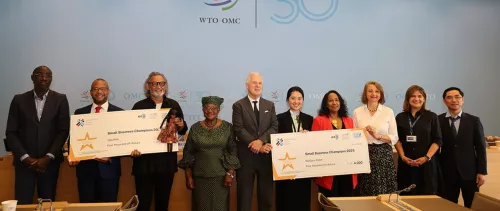
A joint publication entitled “Study Report on Disruptive Technologies” was launched by WTO Director-General Ngozi Okonjo-Iweala and World Customs Organization (WCO) Secretary-General Kunio Mikuriya at a virtual event today (3 October). The publication reviews how so-called disruptive technologies, such as blockchain, the Internet of Things, artificial intelligence and machine learning, can help to improve the conduct of international trade and border management.
The report, a follow-up to an edition published by WCO in 2019, notes the benefits of disruptive technologies for Customs administrations and international traders. However, there are still opportunities for broader implementation, the report underlines, highlighting the challenges and opportunities associated with the adoption of these technologies.
In his opening remarks, WCO Secretary-General Mikuriya said: “I'm pleased that we have been partnering with the WTO since early 2021 to get a more comprehensive review of where we are in using technologies in global trade, and its implication for Customs. The extent to which Customs leverages these new technologies to improve its processes can have an important impact on cross-border trade processes and supply chain operations. Hence, the two organizations decided to jointly assist our respective members in their digital transformation journeys.”
In her opening remarks, WTO Director-General Okonjo-Iweala said: “Disruptive technologies … enable new and innovative business models that can contribute to making trade more efficient and inclusive, such as online retail and lean inventory. They also have the potential to significantly reduce border-related fixed costs, which is especially important for smaller firms. Governments must not lag behind as businesses use digitalization to operate more effectively. The good news — as this study makes clear — is that many governments are doing just that. They are using or experimenting with various digital technologies.”
The report identifies the key ways that disruptive technologies support international trade and economies more broadly and pinpoints ways in which they can assist Customs administrations in terms of trade facilitation, security and revenue collection.
In addition, the publication provides a basis for policy actions that will improve the transition to paperless trade and implementation of the WTO's Agreement on Trade Facilitation.
The launch was followed by short presentations on the experience of deploying disruptive technologies from the Customs administrations of Argentina, the Netherlands, Niger and the Republic of Korea.
The publication can be found here.


